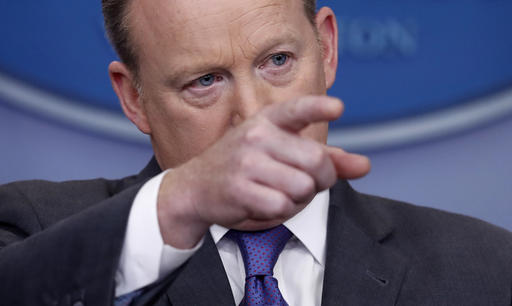
“They should either get with the program or they can go,” said Sean Spicer, Trump’s press secretary.
In startling language, Spicer dismissed the criticism from what he called “career bureaucrats.” While he later said Trump appreciates the work of public servants, Spicer said they should respect the desires of the American people and the importance Trump places on protecting the country.
“If somebody has a problem with that agenda, that does call into question whether they should continue in that post or not,” Spicer said. “This is about the safety of America.”
Spicer’s comments came after career diplomats circulated several drafts of a memo arguing that the executive order Trump signed last week will not make the U.S. safe, runs counter to American values and will fuel anti-American sentiment around the world.
“A policy which closes our doors to over 200 million legitimate travelers in the hopes of preventing a small number of travelers who intend to harm Americans from using the visa system to enter the United States will not achieve its aim of making our country safer,” the diplomats wrote in a so-called “dissent cable” being drafted for State Department leadership.
“This ban stands in opposition to the core American and constitutional values that we, as federal employees, took an oath to uphold,” a draft of the cable said.
U.S. officials said at least several hundred diplomats indicated they would sign the memo and that it was expected to be formally submitted Monday or Tuesday, pending edits to several drafts that were circulating. The final number of signatories will not be available until it is submitted, the officials said. The officials disclosed internal discussions on condition they not be quoted by name, in part because they feared retaliation.
Dissent channel cables are a mechanism for U.S. diplomats to register disagreement internally about U.S. policies. It was established during the Vietnam War and was most recently used by diplomats to criticize the Obama administration’s approach to Syria. In that case, former Secretary of State John Kerry met with signers of the cable to discuss their concerns.
Trump’s secretary of state nominee Rex Tillerson is still awaiting Senate confirmation and it was unclear how we would respond to the memo.
Spicer, however, was not sympathetic and defended the executive order. He said its impact had been “blown way out of proportion and exaggerated.”
Signers of dissent cables are protected from retribution from superiors and the State Department’s official response to the draft memo was less confrontational.
“The Dissent Channel is a longstanding official vehicle for State Department employees to convey alternative views and perspectives on policy issues,” department spokesman Mark Toner said. “This is an important process that the acting secretary, and the department as a whole, value and respect. It allows State employees to express divergent policy views candidly and privately to senior leadership.”
The department, along with other agencies that must implement Trump’s order, has been confused about its details and offered several contradictory instructions to embassies and consulates on how to do so, including how to handle dual citizens.
As word of the executive order began to circulate last week, diplomats at some embassies began to prioritize visa applications from citizens of countries they suspected might be affected, according to officials.
On Friday before the order was signed, workers at one embassy dumped bins of hundreds of approved passports on the floor to pull those from the affected countries and affix visas in them, the officials said. That effort stopped when the order was signed, they said.
The Associated Press

Leave a Reply
You must be logged in to post a comment.